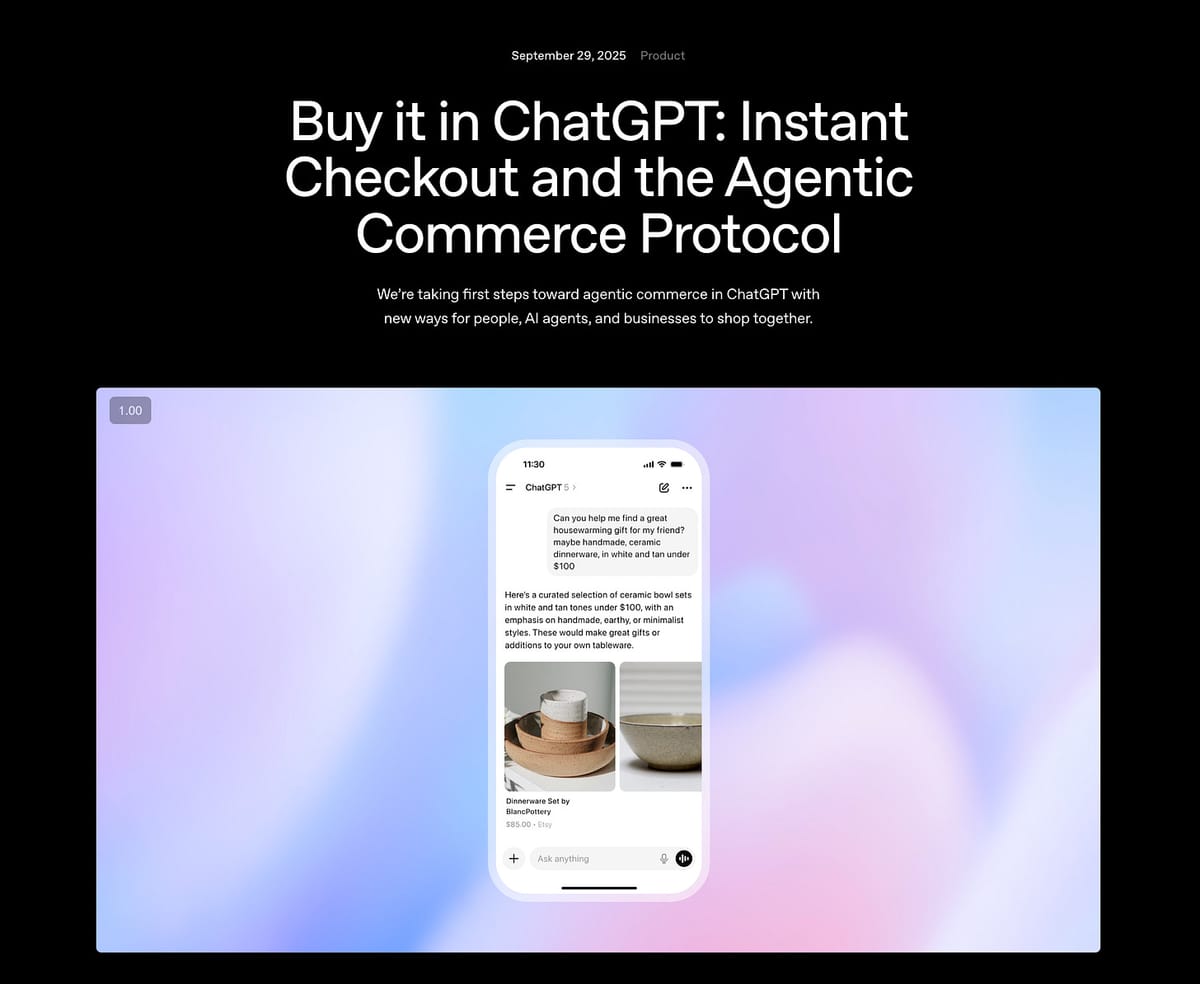Agent Business Agreements and Building AI Economic Infrastructure: Interview with Stripe’s Head of Data and AI, Emily Glassberg Sands

Game-Changing AI Commerce: OpenAI & Stripe Collaboration
One of the most impactful announcements this month is the partnership between OpenAI and Stripe to bring Instant Checkout to ChatGPT:

There have been various attempts to monetize agents — including x402 protocols over MCP — but the entry of two leaders in AI and payments is significant and worth close attention.
Emily Glassberg Sands, Stripe’s Head of Data & AI, shared insights on Stripe’s mission to build economic infrastructure for AI, explaining their internal AI usage and competitive edge for the next growth phase.
---
Inside ACP: Stripe’s Agent Payment Specification

The Agentic Commerce Protocol (ACP) — jointly developed by Stripe and OpenAI — powers ChatGPT Commerce and enables AI agents to discover and purchase from merchant catalogs across ecosystems.
Core Components
- Unified Discovery Layer — Catalog format to browse merchant offerings across platforms.
- Standardized Payment Interface — API flows for initiating and completing purchases in conversational contexts.
- Secure Credential Exchange — Verifies identity and payment authenticity for transactions.
- Event & State Management — Synchronizes transaction records for order management, refunds, and follow-ups.
---
AI-Native Commerce Infrastructure
This new protocol could redefine AI-driven economies — from conversational shopping to cross-platform service aggregation.
For creators exploring monetization, AiToEarn offers an open-source global platform to:
- Monetize AI-generated content.
- Connect AI tools with multi-platform publishing.
- Gain analytics and AI model rankings.
Supported platforms include Douyin, Kwai, WeChat, Bilibili, Rednote (Xiaohongshu), Facebook, Instagram, LinkedIn, Threads, YouTube, Pinterest, and X (Twitter).
---
ACP Technical Details
Catalog Schema
Includes:
- Products
- Inventory
- Pricing
- Brand constraints
Shared Payment Token (SPT)
- Scoped to business, time-limited, capped, revocable.
- No exposure of underlying credentials to agents.
- Compatible with agentic tokens from card networks like Mastercard.
- Carries Radar risk signals for fraud detection.
Integration Note: ACP works with Stripe Link (200M+ consumers) serving as wallet credentials.
---
Foundation Models for Payments
> Stripe’s machine learning for fraud detection has shifted from task-specific to transformer-based domain foundation models.
Key outcomes:
- Treat each charge as a token and behavior sequences as the context window.
- Embed payments to power multiple downstream tasks.
- Ingest tens of billions of transactions with rich features (IPs, BINs, geo, device, merchant traits).
- Focus models on “last-K” relevant events to detect patterns like card-testing.
Detection Improvements: Large merchant card-testing detection rates rose from 59% → 97%, with millisecond latency.
---
Token Billing vs Outcome Pricing
Static plans fail when model capabilities change quickly. Token Billing adapts pricing dynamically by calculating actual model token usage.
effective_price_per_unit = base_margin + (model_tokens_used * provider_unit_cost) + overheadOutcome-based Pricing Example:
Intercom charges $1 per solved support ticket (details).
---
Stripe’s Internal AI Stack
- Toolshed (MCP server) — Unified access to Slack, Drive, Git, Hubble (data catalog), query engines.
- Text-to-SQL Assistants — Both Sigma Assistant (external) and “Hubert” (internal).
- Semantic Events + Real-time Canonicals — Near-real-time feeds for dashboards, Sigma, data exports.
- Engineer Adoption — 8,500 daily users, 65–70% with AI coding assistants.
- AI-Assisted Integrations — Pan-EU payment method integration time cut from ~2 months to ~2 weeks.
---
AI Economy Insights from Stripe’s Data
- Velocity — Top 100 AI companies reach ARR milestones 2–3× faster than comparable SaaS.
- Global First — Serve 2× more countries early; median 55 countries year one.
- Retention — Slightly lower than SaaS but competitive switching common.
- Tiny Teams — High revenue per employee.
- Growth — 7× faster than S&P 500 last year.
---
Full Podcast & Resources
- 🎥 Watch on YouTube.
Timestamps:
- 00:00 — Intro & Emily’s Role
- 00:09 — AI Business Models & Fraud
- 00:16 — Token Billing & Stablecoins
- 00:23 — ACP Launch
- 00:29 — Good vs Bad Bots
- 00:40 — Designing ACP
- 00:49 — AI Adoption at Stripe
- 01:04 — Data Discovery Challenges
- 01:21 — AI Economy: Bubble or Boom?
Show Notes:
---
Key Takeaways
- ACP creates a shared, secure protocol for agent-driven commerce.
- Foundation models boost fraud detection from 59% to 97% accuracy with payment embeddings.
- Token Billing and Outcome-based Pricing align costs with actual AI model value.
- Stripe’s Internal AI Stack enables widespread adoption of AI for integrations, analytics, and operations.
- AiToEarn mirrors these principles in multi-platform AI content monetization for the creator economy.
---
Would you like me to prepare a 1-page executive summary capturing the key strategic insights for startups entering AI commerce?




